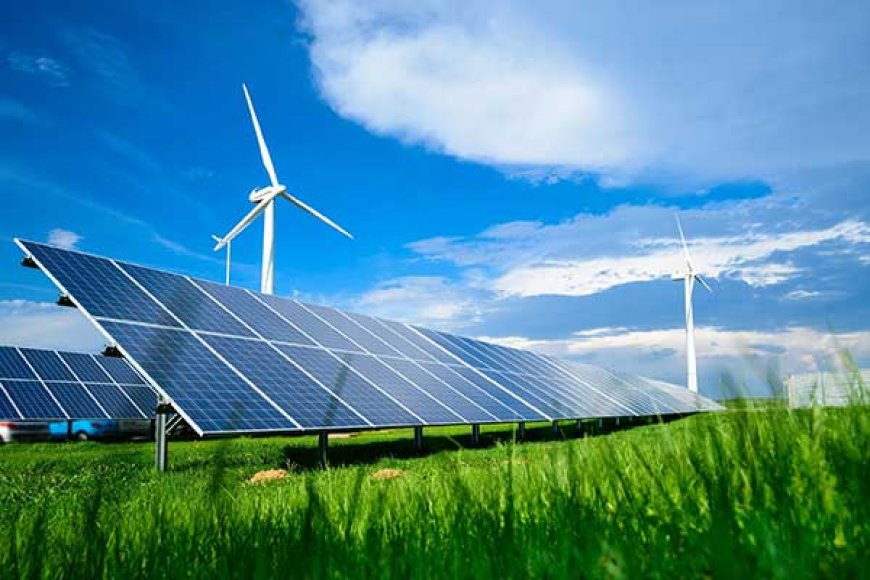Nigeria bets on renewable energy for digital transformation

Nigeria, Africa’s biggest economy, is leaning on renewable energy and digital innovation to accelerate economic inclusion, drive rural transformation, and prepare its workforce for the future.
Director-General of the National Information Technology Development Agency, Kashifu Inuwa, said at the World Bank and IMF annual meetings in Washington that clean energy is a fundamental enabler of digital inclusion, the missing link between rural communities and the modern economy.
“Renewable energy is not the destination. It is a catalyst. When there is power, connectivity follows, and that connectivity triggers true transformation,” Inuwa said.
He explained that reliable access to energy remains critical for scaling up technology-driven services in rural and underserved areas, where connectivity gaps and electricity shortages have slowed development.
Citing real-world examples, the NITDA chief highlighted how access to clean energy and digital tools can transform rural livelihoods. He pointed to AI-powered farming tools, online platforms for women entrepreneurs, and remote digital jobs that enable young Nigerians to participate in the global digital economy without leaving their communities.
“A farmer equipped with a simple app can double his income, send his child to school, and employ others. A young person with internet access doesn’t need to migrate to Abuja or Lagos; he can work from his village and earn in dollars,” Inuwa added.
The NITDA Director-General linked these initiatives to President Bola Tinubu’s Renewed Hope Agenda, which emphasises sustainability, diversification, and inclusivity as central to Nigeria’s growth strategy.
He noted that the country’s National Digital Economy Policy and Strategy, implemented under the Federal Ministry of Communications, Innovation, and Digital Economy, rests on five pillars: knowledge, policy, infrastructure, innovation and entrepreneurship, and trade.
He added that NITDA’s operational framework builds on these priorities through eight strategic pillars, including digital literacy, research, cybersecurity, innovation, and strategic partnerships.
Inuwa disclosed that NITDA, in partnership with the Federal Ministry of Education, is integrating digital literacy into Nigeria’s school curriculum from kindergarten to tertiary education to build a generation of tech-savvy citizens.
“Digital competency is now a prerequisite for employment and promotion in the civil service,” he said, underscoring the government’s effort to make technology a core part of national development.
Through these initiatives, the agency aims to train 50 million Nigerians by 2027, equipping them with the skills required to thrive in an increasingly digital global economy.
“Our vision is clear, our journey is set, and our resolve is stronger than ever. We invite everyone to join us in building a digitally empowered and prosperous Nigeria,” Inuwa concluded.
Also speaking at the session, Senior Operations Officer for Infrastructure at the World Bank Group, Fowzia Hassan, reaffirmed the Bank’s commitment to bridging Africa’s energy access gap through its Mission 300 initiative, which aims to connect 300 million people to electricity by 2030.
Access to energy has always been central to the Bank’s development agenda, but with M300, we’ve set a clear target, a deadline, and the resources to make it happen,” Hassan said.
She explained that the programme consolidates efforts by the World Bank, International Finance Corporation, and Multilateral Investment Guarantee Agency to strengthen energy regulations, attract private investment, and deploy innovative financing tools such as blended finance and risk-sharing facilities to reach underserved communities.
Highlighting the gender aspect of energy access, Hassan cited data from the International Renewable Energy Agency showing that women account for 32 per cent of Africa’s renewable energy workforce, though most occupy non-technical roles.
“Women are vital consumers, producers, and decision-makers in energy. Yet they face barriers ranging from finance to education and workplace inclusion,” she noted, calling for deliberate efforts to increase women’s participation in technical and leadership positions.
She said the World Bank is supporting several initiatives across Africa, including partnerships with the African Development Bank on National Energy Compacts, the DAIRS Programme in Nigeria, designed to mobilise over $1 bn for mini-grids and solar systems, and the Women in Energy Network Africa, which has already facilitated employment for 57 women, with a target of creating 4,000 energy sector jobs for women within three years.
“Creating a clean, inclusive, and just energy transition is not just about connecting homes; it’s about empowering people, especially women and youth, to drive Africa’s prosperity,” Hassan said.
The discussions at the forum underscored a growing recognition that energy access and digital connectivity are inseparable pillars of sustainable development. For Nigeria, the bet on both renewable energy and innovation reflects a broader push to lift millions out of poverty and position the country as a regional leader in Africa’s digital transformation.

 admin
admin 


